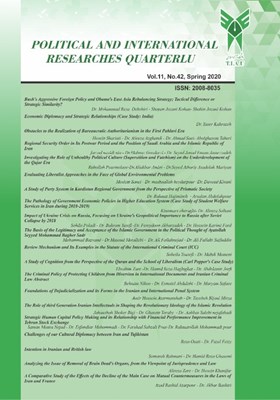-
-
List of Articles
-
Open Access Article
1 - Bush's Aggressive Foreign Policy and Obama's East Asia Rebalancing Strategy; Tactical Difference or Strategic Similarity
Mohammad Reza Dehshiri Shayan Jozani Kohan Shahin Jozani Kohan -
Open Access Article
2 - Economic Diplomacy and Strategic Relationships (Case Study: India)
Yaser Kahrazeh -
Open Access Article
3 - Obstacles to the Realization of Bureaucratic Authoritarianism in the First Pahlavi Era
Hosein Shariati Alireza Azghandi Ahmad Saei Abolghasem Taheri -
Open Access Article
4 - Regional Security Order in Its Postwar Period and the Position of Saudi Arabia and the Islamic Republic of Iran
farzad navidi nia Mahnaz Goodarzi Seyed Javad Emam Jomezzadeh -
Open Access Article
5 - Investigating the Role of Unhealthy Political Culture (Superstition and Fatehism) on the Underdevelopment of the Qajar Era
Ruhollah Pourmolaee Aliakbar Amini Asadolah Athariy -
Open Access Article
6 - Evaluating Liberalist Approaches in the Face of Global Environmental Problems
Moslem Sanei mashaallah heydarpour Davoud Kiyani -
Open Access Article
7 - A Study of Party System in Kurdistan Regional Government from the Perspective of Prismatic Society
Rahmat Hajimineh Arsalan Abdolahpour -
Open Access Article
8 - The Pathology of Government Economic Policies in Higher Education System (Case Study of Student Welfare Services in Iran during 2010-2019)
Kiuomars cheraghi Alireza Soltani -
Open Access Article
9 - Impact of Ukraine Crisis on Russia, Focusing on Ukraine's Geopolitical Importance to Russia after Soviet Collapse by 2018
Sohila Poladi Bahram Yusefi Fereydoon Akbarzadeh Hossein Karimi Fard -
Open Access Article
10 - The Basis of the Legitimacy and Acceptance of the Islamic Government in the Political Thought of Ayatollah Seyyed Mohammad Bagher Sadr
Mohammad Bazvand Masoud Motallebi Ali Fallahnejad Ali Fallahi Saifuddin -
Open Access Article
11 - Review Mechanism and Its Examples in the Statute of the International Criminal Court (ICC)
Soheila Yousefi Mahdi Momeni -
Open Access Article
12 - A Study of Cognition from the Perspective of the Quran and the School of Liberalism (Carl Popper's Case Study)
Ebrahim Zare Hamid Reza Haghighat Abdolamir Jorfi -
Open Access Article
13 - The Criminal Policy of Protecting Children from Diversion in International Documents and Iranian Criminal Law Abstract
Behnam Nikoo Esmaiel Abdulahi Maryam Safaee -
Open Access Article
14 - Foundations of Dejudicialization and its Forms in the Iranian and International Penal System
Amir Azarmanshah Tayebeh Bijani Mirza -
Open Access Article
15 - The Role of third Generation Iranian Intellectuals in Shaping the Revolutionary Ideology of the Islamic Revolution
Jahanshah ShokerBigi Ghasem Toraby Aabbas Salehi nejafabadi -
Open Access Article
16 - Strategic Human Capital Policy Making and its Relationship with Financial Performance Improvement in Tehran Stock Exchange
Saman Mousa Nejad Esfandiar Mohammadi Farshad Sabzali Pour Rahmatollah Mohammadi pour -
Open Access Article
17 - Challenges of our Cultural Diplomacy between Iran and Tajikistan
Reza Osati Fazel Feizy -
Open Access Article
18 - Intention in Iranian and British law
Somayeh Rahmani Hamid Reza Ghasemi -
Open Access Article
19 - Analyzing the Issue of Removal of Brain Dead's Organs, from the Viewpoint of Jurisprudence and Law
Alireza Zare Hosein Khanifar -
Open Access Article
20 - A Comparative Study of the Effects of the Decline of the Main Case on Mutual Countermeasures in the Laws of Iran and France
Azad Rashid Azarpour Akbar Bashiri
-
The rights to this website are owned by the Raimag Press Management System.
Copyright © 2021-2025







